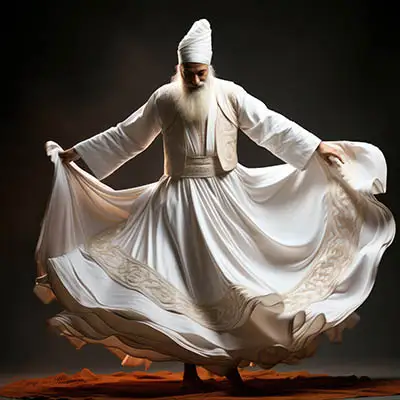
Rumi
Rumi Frequently Asked Questions
Who was Rumi?
Rumi, also known as Jalal ad-Din Muhammad Rumi, was a 13th-century Persian poet, Islamic scholar, and Sufi mystic. He is best known for his mystical poetry and writings which have had a profound influence on Persian and global literature.
Where was Rumi born?
Rumi was born in the city of Balkh, which is now located in modern-day Afghanistan, in the year 1207.
What is the significance of Rumi's poetry?
Rumi's poetry is known for its deep spiritual and mystical themes, with a focus on love, unity, and the pursuit of a deeper connection with the divine. His poems have been widely translated and continue to inspire people around the world.
What language did Rumi write in?
Rumi wrote most of his poetry in Persian, which was the literary language of the Persian Empire during his time.
What is Rumi's most famous work?
Rumi's most famous work is the "Masnavi-i Ma'navi" or "Spiritual Couplets", a six-volume poem that is considered one of the greatest works of Persian literature.
What is Sufism?
Sufism is a mystical branch of Islam that focuses on seeking a personal and direct experience of the divine. Rumi was a prominent figure in the Sufi tradition.
Was Rumi a religious figure?
While Rumi was a devout Muslim and Islamic scholar, his teachings transcend specific religious boundaries and are often seen as conveying universal spiritual truths.
What is the significance of Rumi's friendship with Shams of Tabriz?
Rumi's friendship with the mystic Shams of Tabriz was a transformative and deeply spiritual relationship that profoundly influenced Rumi's poetry and teachings.
How did Rumi's poetry become popular in the West?
Rumi's poetry gained popularity in the West in the 20th century through translations by scholars and poets such as Coleman Barks, who played a significant role in introducing Rumi to English-speaking audiences.
What is the "whirling dervish" tradition associated with Rumi?
The whirling dervishes are followers of the Mevlevi Order, a Sufi order founded by Rumi's disciples. They perform a meditative dance known as the "Sema" to express their devotion and achieve a state of spiritual transcendence.
What themes are prevalent in Rumi's poetry?
Love, unity, spirituality, and the quest for divine truth are some of the predominant themes in Rumi's poetry.
How did Rumi's upbringing influence his later works?
Rumi was raised in a family of scholars and religious teachers, which greatly influenced his intellectual and spiritual development, leading him to become a respected Islamic scholar and mystic.
What is the impact of Rumi's poetry on modern-day readers?
Rumi's poetry continues to resonate with readers around the world due to its timeless themes of love, compassion, and spiritual growth, offering a source of wisdom and inspiration.
What is the significance of Rumi's quotes and sayings?
Rumi's quotes and sayings are often used as sources of spiritual guidance and inspiration, encouraging readers to reflect on life's deeper meanings and the pursuit of inner peace.
Was Rumi's poetry controversial during his time?
While Rumi's unconventional and mystical approach to poetry may have been controversial in orthodox religious circles, his work ultimately gained widespread acclaim for its profound spiritual insights.
How did Rumi's death impact his followers?
Rumi's death in 1273 was a profound loss for his followers, but his teachings and poetry continued to spread, leading to the establishment of the Mevlevi Order and the enduring legacy of his spiritual teachings.
What is the significance of Rumi's shrine in Konya, Turkey?
Rumi's shrine in Konya, Turkey, known as the Mevlana Museum, is a popular pilgrimage site and a place of spiritual significance for his followers and admirers.
What is the connection between Rumi's poetry and music?
Rumi's poetry has inspired a rich tradition of music in the form of Sufi music, incorporating elements of poetry, chanting, and traditional instruments to create a mystical and transcendent experience.
How has Rumi's poetry influenced modern literature and art?
Rumi's poetry has been a source of inspiration for writers, artists, and musicians around the world, influencing diverse forms of creative expression and fostering a deeper appreciation for the beauty of language and spirituality.
What is the enduring legacy of Rumi's teachings?
Rumi's teachings emphasize the importance of love, compassion, and spiritual growth as pathways to attaining deeper understanding and connection with the divine, offering timeless wisdom that continues to resonate with seekers of all backgrounds.

